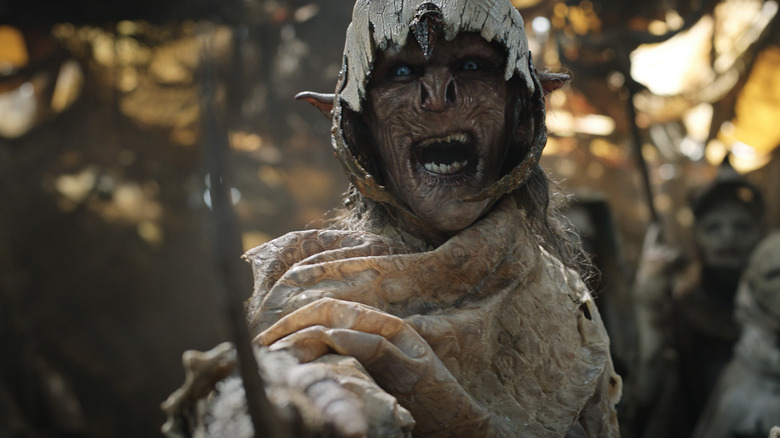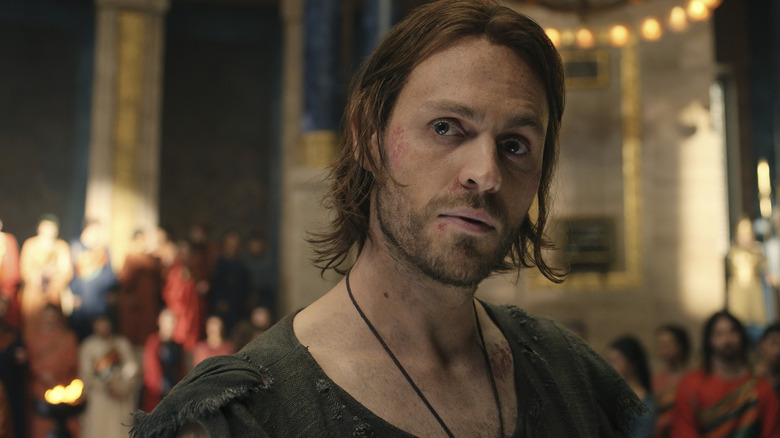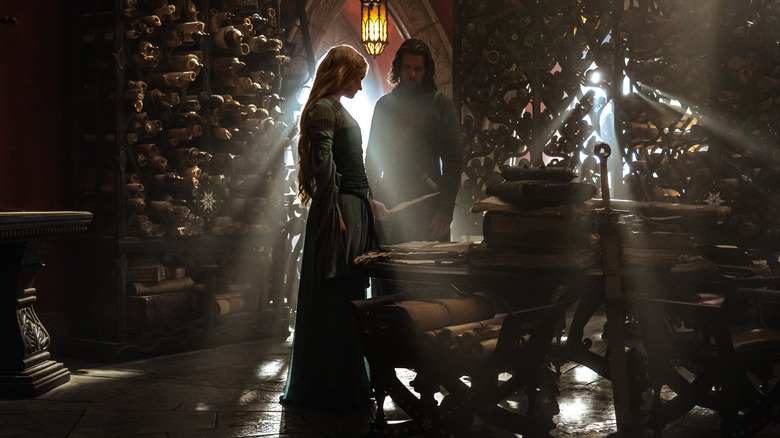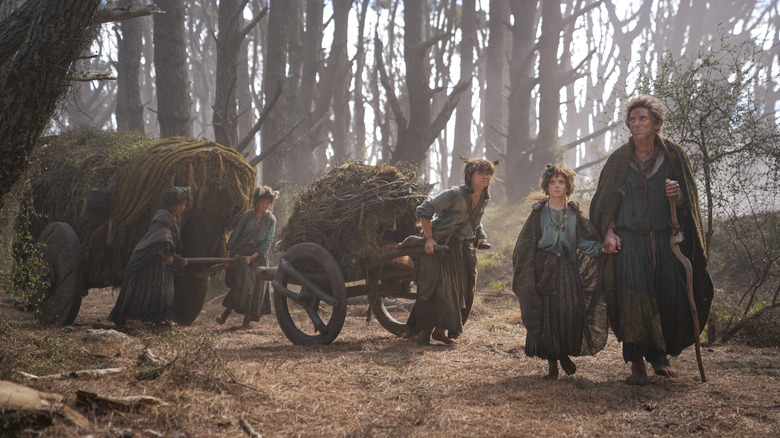The Lord Of The Rings: The Rings Of Power Reveals The Enemy's Plan And Teases A New Threat
If you've watched one Middle-earth tale, then you've watched them all, right? By now, you'd have to be actively avoiding the fantasy genre as a whole if you wanted to stay blissfully unaware of the rules of engagement here. When adapting the writing of J.R.R. Tolkien, you can expect lots of walking, lots of lore and backstory, and a whole lot of talk about good vs unambiguous evil. And in the two-episode premiere of "The Lord of the Rings: The Rings of Power," that's exactly what we got. As /Film's Chris Evangelista put it succinctly in his review of the first pair of episodes:
'"The Rings of Power' can't escape the shadow of Peter Jackson's 'Lord of the Rings' trilogy. In fact, I'm not even sure the show wants to distance itself ... And to be fair, if it ain't broke, don't fix it."
It can be particularly tricky for a new series to burst out of the starting gate at full speed, especially when the first couple of table-setting hours tend to come with the crushing weight of mountains of exposition, a bevy of character introductions, and an overall mandate to establish the tone in a way that will hook viewers and keep them coming back. That's hardly an easy task, but showrunners J.D. Payne and Patrick McKay understood the challenge of adapting some seriously complex material. Rather than benefiting from an entire trilogy of novels, as Jackson did, the creative team behind "The Rings of Power" are relying on a collection of notes, excerpts, and rather straightforward descriptions of what went down during the Second Age of Middle-earth history, most of which are found in the appendices affixed to the end of "The Return of the King." Despite such vast differences in source material, however, "The Rings of Power" has certainly tried to feel of a piece with the trilogy that defined the look and feel of this world for most audiences.
Until episode 3, titled "Adar," finally shook things up. The end result produced a brand new setting, a more focused storyline, and a big villain reveal (or, more accurately, two of them) that might change Middle-earth in ways we've never seen before.
Paradise or prison?
Narrowing the scope of the story and neatly splitting the action between far-flung locations, "Adar" hurries to resolve the twin cliffhangers that ended episode 2. After briefly checking in with poor Arondir (Ismael Cruz Córdova), now a captive in an orc-run labor camp (many of whom speak of a mysterious "Adar" in hushed tones) along with the missing villagers of Hordern and his own regiment of elven soldiers, the bulk of the hour dedicates itself to the plight of Galadriel (Morfyyd Clark) and Halbrand (Charlie Vickers). Rescued from certain death in the Sundering Seas by a ship captain with uncertain motives, it soon dawns on the unlikely pair that they've been brought to the island kingdom of Númenor to await the judgment of the suspicious Queen Regent Miriel (Cynthia Addai-Robinson) and her advisor Pharazôn (Trystan Gravelle).
Even for those unfamiliar with the backstory of Númenor, the stirring sequence bringing us into the realm immediately conveys just how significant this new locale will be. Borrowing from our conception of Rome at the peak of the empire and the myth of seafaring Atlantis, the visual design of the sprawling city also evokes our recollections of Gondor in "The Lord of the Rings" — down to massive and similarly-fashioned statues (this is the part where nerds like me poked the person sitting next to them and whispered, "That's like the Argonath!"), architecture, and even a strikingly Minas Tirith-looking building complete with a white tree of its own. This choice makes perfect sense, mind you, as these inhabitants are the ancestors of characters like Boromir and Aragorn. Taken together, there might as well be a flashing neon sign telling us that Númenor is a big, big deal.
Not that Galadriel got the memo, of course. She and Halbrand are immediately set at odds: Galadriel refuses to remain a prisoner of haughty humans who only reside on that island thanks to the charity of elves, having once allied themselves with elves of the First Age against Morgoth and been rewarded for their efforts with Númenor. While she's eager to return to the mainland to continue her hunt for Sauron, the Southlander Halbrand sees this "paradise" as a potential fresh start. Little do they know that Númenor contains secrets with wide-ranging implications for both of them, just waiting to be unleashed.
A conspiracy unmasked
For Galadriel and Halbrand, things don't turn out as they'd assumed. Since the isolationist Númenoreans essentially cut all ties with their former elf allies long ago, Galadriel is scorned as an outsider and an unwanted presence and already plans to sneak her way off the island ... until that same ship captain who initially rescued her, the "elf-friend" Elendil (Lloyd Owen), becomes an unexpected source of friendship and offers her an alternative path forward. In the Hall of Laws, the mystery of Sauron's mysterious symbol is answered — though in somewhat clunky fashion. According to an old document that's uncovered just a little too conveniently, Sauron's orcs have enacted a backup plan created in the event of Morgoth's prior defeat. Galadriel then deduces the "sigil" is actually a map pointing towards the Southlands, corroborating Halbrand's story from the last episode.
But as big of a bombshell as this is, why exactly Sauron would carve this map on the corpse of Galadriel's brother in the premiere — or choose such an easily decipherable symbol in the first place — remains weirdly unclear.
While Galadriel is forging her new ally (between Richard Aramayo's Elrond, Vickers' Halbrand, and now Owen's Elendil, I've simply accepted that Morfyyd Clark has simmering chemistry with everyone she encounters), Halbrand takes a slightly different route. After displaying some impressive diplomacy to keep the peace with the Queen Regent earlier in the episode, the unruly human soon finds himself showing off a very different skill set altogether. Denied the chance to join the prestigious forging guilds on the island nation, Halbrand soon attracts the attention of some of the more unsavory Númenoreans. Despite distracting them with drinks, his attempt to pickpocket a special guild token that would allow him entry doesn't go unnoticed.
Most of the action to this point in the series has involved fantastical creatures, giving us a measure of distance from the violence, but this is the first time we really see someone let loose on fellow humans in genuinely bone-breaking fashion. The ill-advised brawl ends with him behind bars and Galadriel free on the other side, an amusing reversal of fortunes that's further compounded when we discover Halbrand's the long-lost king of the Southlands. With both looking for a chance at redemption, the script strengthens the thematic bonds between both characters and sets them up for an exciting storyline to come.
Of migrating Harfoots and prison-breaking elves
One drawback of these sorts of sprawling ensemble shows comes from the fact that most episodes simply can't afford to spread themselves too thin by checking in with each and every character. That means that, after receiving much of the spotlight last week, Elrond and Prince Durin (Owain Arthur) completely sit out the action this time around. As for our lovable Harfoot clan, it takes nearly 40 minutes before we catch up with the drama involving Nori (Markella Kavenagh), Poppy (Megan Richards), and the enigmatic Stranger (Daniel Weyman) on the eve of the Harfoots' planned migration. And sprinkled throughout the hour, we follow Arondir's increasingly desperate attempts to free himself and his fellow prisoners from the sinister orcs.
These two storylines are linked by the idea of how far individuals will go to stick their necks out for another person — whether they owe them such selflessness and self-sacrifice or not.
Among the diminutive Hobbit ancestors, this takes the form of Nori remaining hellbent on assisting the Stranger at all costs. Despite his impressive star-related display last week resulting in the ominous deaths of all those fireflies, the helpful Harfoot concocts a harebrained scheme to break into Sadoc's (Lenny Henry) book of mystical star charts and give the Stranger another tool to figure out where he needs to go. In a much-needed breaking of tension, we get one of the funniest sequences in the show so far when Poppy tries to give incognito directions to Nori while she fumbles around to grab the charts from right behind Sadoc's back ... even if it's all for naught when everyone finds out about the Stranger anyway. Who says Middle-earth has to be all doom and gloom, all the time?
In the filthy hovel the orcs force their prisoners to dig out, Arondir finds out the hard way that cruelty and death can be meted out at a moment's notice. Despite their valiant efforts, the senseless murders of fellow elves Médhor (Augustus Prew) and the watchwarden Revion (Simon Merrells) breaks something in Arondir. This bleak sequence ends without much hope, in stark contrast to the Harfoots earning the assistance of the Stranger as they migrate to a new home, as the eponymous and obviously villainous Adar finally makes its appearance in the closing moments.
Sauron isn't the only threat our heroes will have to contend with.
Riddles in the dark and other stray thoughts
- The Music of Middle-earth: Before we go any further, how about three hearty cheers for the continually impressive musical work by Bear McCreary? Sure, certain themes hew a little too close for comfort to composer Howard Shore's work on "The Lord of the Rings," particularly the deep horns and bellowing choir used for the dwarf sequences in Khazad-dûm. But it's hard to complain much when major characters, notable setting, and even moods are all differentiated by memorable and wonderfully distinct scores. This episode's highlight has to be the new theme introduced for Númenor, one that feels like a perfect companion piece to the trumpet-filled Gondorian theme used throughout Peter Jackson's trilogy.
- A Smooth Transition: On a similar note, director Wayne Che Yip ("Preacher," "Doctor Who," "The Wheel of Time") steps up to fill the big shoes left by episodes 1 and 2 director J.A. Bayona and doesn't miss a single step. Despite the episode taking the action from confined interior sets to open-air cities to stunning on-location photography, the highly-charged emotions of all the characters involved remain at the forefront. The attempted prison break from the orc camp and the beautifully staged nighttime scenes with the Harfoots are both clear standouts.
- A Bad Case of Sunburn: Speaking of orcs, Tolkien aficionados like myself — a notoriously hard-to-please group of grumps — will surely be happy with a couple of things here. First, the gloriously practical designs of these orcs instantly call back to some of the best and most disgusting counterparts in "The Lord of the Rings." That tactile and lived-in feel was sorely missed in "The Hobbit" movies, so it's great to see that emphasized here. Secondly, how about these orcs having an intense physical reaction to sunlight? Tolkien famously described the orcs suffering from the same phenomenon in his novels, but we've never quite seen it depicted as dramatically as this. Even better, it leads to a few clever tactical advantages that Arondir takes advantage of.
- Speech! When Sadoc steps up to deliver his speech the night before the Harfoots break camp, how many of us thought of Bilbo's birthday speech in front of a similarly lively crowd of Hobbits at the beginning of "The Fellowship of the Ring"? This one took a much more melancholy turn than that other scene, with the older Harfoot detailing all those left behind on previous migrations and hinting at just how tough life has been for this group of people. One poignant zoom-in on Poppy when Sadoc reads a particular name says a lot about her upbringing without the otherwise comedic character needing to say a word.
- Familiar Faces: There wasn't much room to discuss some other minor characters introduced in this episode, but your eyes should've perked up once we met Elendil's discontented son Isildur (Maxim Baldry), his sister Eärien (played by Ema Horvath in a role invented for the series), and the name-drop of his brother Anárion. Both brothers end up playing massive roles during this time in Middle-earth history, with Isildur, in particular, going on to influence the events of "The Lord of the Rings" in profound ways — go back and watch the prologue of "The Fellowship of the Ring" if you need a reminder. The scene of domestic squabbling between Elendil and his children indicates a potentially intriguing role for all these characters moving forward.
- Adar who? Okay, time to address the Oliphaunt in the room. Just who the heck is the Adar in the episode's title supposed to be? Rumors have swirled for months and even years regarding this mystery character. I'm sure I wasn't the only one frustrated when the episode ends with only a fuzzy, out-of-focus shot at Adar's eerily humanoid-looking face. However, eagle-eyed viewers may have already spotted more footage of him in various trailers. In any case, chances are this isn't Sauron, but a look at some old Elvish translations might provide some answers. Adar apparently means "Father" and given the character's apparent leadership role among the orcs, well, I'll let you connect the dots there.




